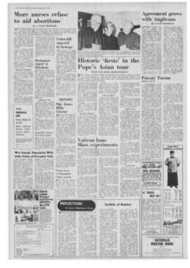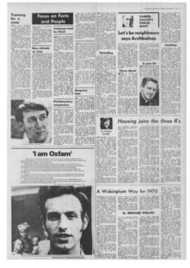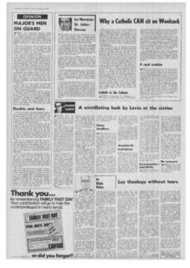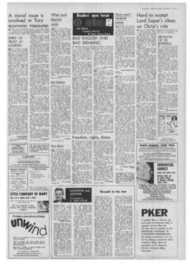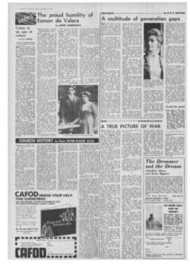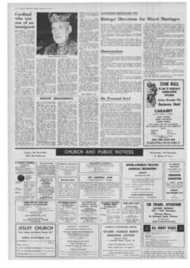Page 3, 6th November 1970
Page 3

Report an error
Noticed an error on this page?If you've noticed an error in this article please click here to report it.
Tags
Share
Related articles
Hull. University Joins Irish Ecumenics School
Screen And Science In Jesuit Eyes
Dean John Linehan. 84, Has Retired As Parish Priest Of
Fr. Hannan, Assistant To Jesuit General, Dies
GABRIEL FALLON'S DUBLIN DIARY
Let's be neighbours says Archbishop
THE Irish School of Ecumenics will present its inaugural lecture on Monday in the public lecture hall of the Jesuit house at Milltown Park, Dublin. It will be delivered by the Rev. Dr. Eugene Carson Blake, general secretary of the World Council of Churches, and will be followed by a reception in the Milltown Park dining hall.
An official statement declares that the school is not just another "ecumenical centre" or "ecumenical institute" offering courses of lectures on the doctrine and life of the various Christian traditions and on the manifold problems facing the ecumenical movement so as to make up what is %valuing . in religious and theological education at every level.
,Dwindling
On the contrary, it is a graduate school of theology specialising in all aspects, doctrinal and non-doctrinal, of the movement for Christian unity. It offers a systematically organised programme of postgraduate courses not on offer elsewhere. Already the announcement of its inaugural lecture has attracted a great deal of attention.
It was inevitable that the Protestant Archbishop of Dublin should strongly criticise the Catholic Hierarchy's recent pronouncement on those religious principles concerning marriage "which neither Popes nor bishops can change."
While Dr. Buchanan expressed himself as "much heartened by the sympathy extended to us by many of the majority here" he deplored a ruling which, he held, would lead to the diminution of the Church of Ireland in the Republic.
That the archbishop's Church is dwindling numerically, not only here but in the North of Ireland, is an observable fact; but even the most sympathetic among us would not attribute this decline, as Dr. Buchanan seems to do, wholly to the Catholic ruling on marriage.
In making a plea for an intensification of neighbourliness and mutual understanding the Archbishop said: 'let us
see the best in one another. It is so easy to pinpoint the failings, sooner or later we Irish people must learn to live in harmony. Why not now?"
He went on to quote from the speech made by King George V on the opening of the Northern Ireland Parliament almost half a century ago : "I appeal to all Irishmen to pause, to stretch out the hand of forbearance and conciliation, to forgive and to forget, and to join in making for the land they love a new era of peace, contentment and goodwill."
Storm ahead
B0TH the friends and enemies of Ireland's Taoiseach, Mr. Jack Lynch, would say (for different reasons, of course) that his speech to the United Nations assembly was made in the spirit of King George V. A great hosting of Fianna Fail, the Old Guard and the new (significantly led by Mr. de Valera's personal representative) greeted him on his return from America. Heaven knows, he needed this "We-alllove-Jack" homecoming, for he was walking right into trouble.
Faced with the internal fissure in his party made by the arms trial dissidents and their possible supporters, as well as Fine Gael and Labour clamour for a General Election (backed by a no confidence motion from a seemingly united opposition) Jack surveys the scene, attempts to steady his party, and with that Gascon touch so typical of his Cork heritage, carried the war into the enemy's camp by demanding a vote of confidence in his government.
Will he weather the storm? Will there be a General Election? These are the questions we are all asking. But one thing is certain — that the sentiments expressed in his speech to the United Nations are shared by everyone who has the interests of Ireland at heart.
A poor lot
HOWEVER, Miss Bernadette Devlin, M.P. for MidUlster, "trained but not tamed, disciplined yet not dulled" by her sojourn as Her Majesty's guest in Arrnagh's house of correction, would probably think otherwise. She believes we're a poor lot down here; and she's probably right.
Speaking at a meeting of the Historical Society in Trinity's (Catholic?) College (Fr. Brendan Heffernan is now its first Roman Dean of Residence) she said she found "very little difference in being a slave to a British system, a 26-county one or a green 32-county one" since ourlives were controlledby Big Business.
Her solution? Extreme Socialism. "We are the people," she said. "We do the work, and we have the power if we stop crawling about the feet of our leaders. The workers should be told not that they could take a little more but that they could take everything."
Coalition
Acknowledging that there were some obstacles in the way she continued: "If we are going to have it we will have to stand on Mother Church's toes and on Charlie Haughey's toes—and the harder the better!" A remark which prompted my Dubliner (a housepainter) to say: "That gerril's as good as a pantoniime" Dr. Noel Browne, Labour T.D. without anything of Bernadette's liveliness, told the meeting that none of our so called Republican leaders Cosgrave, Lynch, de Valera, McBride, Costello—had been prepared to subordinate their loyalty to the Catholic Church and its social and economic teachings, to the objective of achieving a United Ireland. That is a strange statement in the light of the fact that these same social and economic teachings are in this country widely studied but seldom if ever practised.
Lord Longford, who also addressed the meeting, saw coalition as the answer to the Northern Ireland question. The Catholics in the North must feel a part of the State if there was to be a solution. At the same time the British Government must make it clear that it desired to see Ireland united as a final objective.
The better the minority were treated in the South, the more attractive unity would be to the majority in the North . . But this is where we came in — or so it would seem from the Rev. Dr. Buchanan's remarks on the mixed marriage question.
blog comments powered by Disqus



